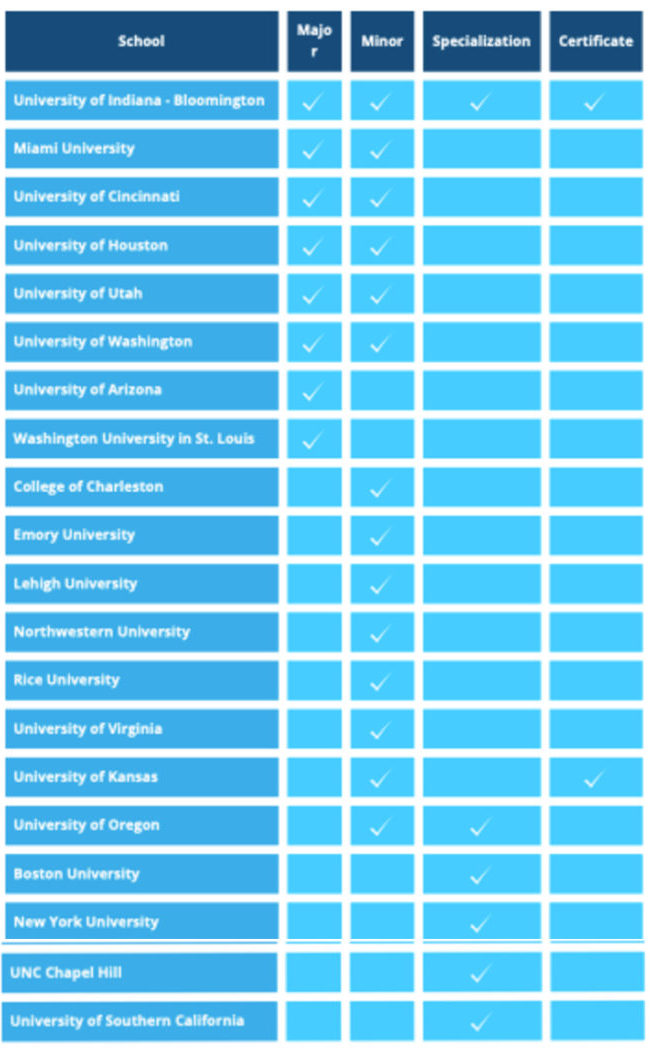
Future entrepreneurs: Charting your college path as a business major
Posted by
So you don’t just want a career in business because you want to actually build a business yourself? That’s exciting! For future entrepreneurs, college serves as a valuable launchpad, offering connections and opportunities that can fuel big ideas. But entrepreneurship isn’t a linear field, and many people in the trades, the arts, and tech build businesses without attending college or studying business.
Still, earning your degree in business comes with significant benefits. A business degree provides foundational knowledge, practical skills, and hands-on experience through internships for a successful start to your career. But if your goal is entrepreneurship, is a business degree your only option, or could another major better support your ambitions? Let’s find out!
Can I earn a degree in entrepreneurship?
Yes, some colleges and universities offer full degrees in entrepreneurship, where the entire program (from courses to extracurriculars) is designed to prepare you to one day start and run your own business. Other programs integrate entrepreneurship as a specialization within a broader business major; after completing your core requirements, you take additional entrepreneurship-focused courses. Other schools may offer entrepreneurship as a minor or certificate.
Start with this list of 20 schools where you can study entrepreneurship (this list is by no means exhaustive; research available programs at the schools that interest you):

Top college majors for entrepreneurs
Hundreds of U.S. colleges have strong undergraduate business programs, but only a handful offer a dedicated entrepreneurship degree. Because it’s a dynamic process of developing skills, testing ideas, and learning how to work with people and money, you can’t master entrepreneurship from a textbook.
Long story short: no single “right” major exists for future founders. If you’re driven to start something, you’ll find your own path. Still, certain majors can give you a leg up and offer direction. Here are eight worth considering:
- Business Administration. A broad degree covering management, leadership, operations, and strategy. It provides a solid foundation in organizational operations and equips you to manage a company’s multifaceted demands.
- Accounting. Focused on tracking, analyzing, and reporting financial information. You’ll learn how money moves through a business and how to keep finances organized and transparent.
- Finance. Concentrates on investments, capital markets, and financial planning. This major teaches how to assess risk, make strategic financial decisions, and allocate resources effectively.
- Economics. Studies how markets function and what drives growth, competition, and consumer behavior. It provides the tools to analyze big-picture trends and understand the forces shaping entire industries.
- Marketing. Centers on brand-building, customer research, and communication strategies. You’ll learn how to connect with audiences, position products, and design campaigns that drive sales.
- Computer Science. Covers programming, data structures, and the design of digital systems. This major provides the technical skills necessary for creating technology products and optimizing business operations with digital tools.
- Sociology. Explores how groups, communities, and societies function. It helps you see how culture, demographics, and social trends influence behavior and markets.
- Psychology. Focuses on how people think, feel, and act as individuals. You’ll study decision-making, motivation, and behavior, giving you an edge in leading teams, creating effective marketing campaigns, and designing desirable products.
Let’s say you’re passionate about business, but also drawn to something “unrelated” like physics, art, political science, or linguistics. (Spoiler alert: In today’s market-driven world, almost everything has a business angle.) Go ahead — follow your passion! Pairing a few business courses with hands-on experience from internships or clubs will provide the skills and inspiration needed to launch your own ventures.
Double majors, joint degrees, and interdisciplinary programs
Simply earning a college major is a huge accomplishment, but it’s your education, and you should absolutely customize it to fit your interests and goals. When exploring business programs, seek unique opportunities to dive deep into topics that spark your curiosity.
Some programs allow students to double major, combining a business degree with a non-business field of study. Others offer interdisciplinary or joint programs, giving you access to courses, faculty, and resources across departments. For example, USCMarshall offers four joint degrees with the School of Business:
- Artificial Intelligence for Business (in partnership with the Viterbi School of Engineering)
- Business of Cinematic Arts (in partnership with the School of Cinematic Arts)
- Real Estate Finance and Development (in partnership with the Sol Price School of Public Policy)
- Accounting and Finance (in partnership with the Leventhal School of Accounting)
These programs bridge disciplines, giving you both a broad perspective and targeted skills for your future career.
How to choose the right degree program
Factors like size, culture, cost, and location play a crucial role in determining whether a college is a “good fit”; however, none outweigh the importance of choosing a program aligned with your academic passions and career goals. When researching programs:
- Explore course lists and electives. Maximize your business major by choosing a program that lets you tailor your studies with classes in entrepreneurship and your other interests. If you're not a business major, consider a business minor, certificate, or elective courses.
- Look for experiential learning opportunities. Summer internships, co-ops, capstone projects, competitions, student innovation hubs, and incubators are great options.
- Make a college checklist. Consider which extracurricular experiences will complement your degree, such as studying abroad, joining student organizations, or participating in faculty research, and look for programs that integrate these opportunities.
Check out our Guide to Business and Entrepreneurship for more resources, too!
Blog Categories
- Career Advice
- College Admissions
- Colleges & Universities
- Financial Aid and Scholarships
- For Counselors
- For Parents
- For Students
- Gap Years
- Mental Health and Wellness
- Online Learning
- Performing and Visual Arts
- STEM Majors and More
- Summer Programs
- Teen Volunteering
- Trade & Vocational Schools
- Tutoring & Test Prep

Organization with listings on TeenLife? Login here
Register for Free
We’re here to help you find your best-fit teen-centered academic and enrichment opportunities.
Forgot Password
"*" indicates required fields








